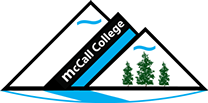
Let’s Change the Future
By Dr. L. Bryan Williams Published: Star News, McCall, ID Oct 24, 2019, A3
How would you like add around $10,000 a year to your income? Sound like a pyramid scheme? Nope. If you did not finish high school, the answer is simple: get your GED. According to the US Census Bureau, completing a GED will often elevate a student’s salary from an annual average of $20,000 to an annual average of $30,000. How many struggling families in our region would appreciate an extra $10,000 in their annual budget?
How would you like to help reduce the burden on local taxpayers by $200,000 to $300,000? The answer is the same: help one person get one’s GED. The PBS program Frontline outlined how a high percentage of people in the social safety system are lacking a high school education. When the price tag of increased costs of key expenses--teenage and single mom programs, health care, law enforcement, incarceration, and food programs—is added up, the cost grows to around $300,000 over one person’s lifetime. Other studies on students who fail to complete high school show similar costs. Helping one student is significant. What if we helped more?
Helping 100 students without a high school credential complete their GED would lower the lifetime burden of costs incurred by taxpayers by something in the order of $20 million dollars. While there are many ways the taxpayer can help to reduce local taxes, encouraging a GED program in the region may be one of the most powerful cost-saving ideas missing in our region. How big is this regional problem that a GED program would solve?
The 2018 American Community Survey Data documents that 10% of Idaho residents are without a high school credential. If an area has a higher proportion of undocumented immigrants, the number is higher. Our three-county region—Valley, Adams, and Idaho counties—has a population of 31,103 (2017). That would mean that in the vicinity of 3,110 residents are lacking a high school credential. When you crunch the numbers of unfinished high school students in our region, the cost to the taxpayer is staggering. How do we solve this problem?
McCall College, along with its partnerships with local libraries, the juvenile justice system, the Laura Moore Cunningham Foundation, and local schools, is addressing the problem with a GED Program. The program will first assess each adult student to discover how far the student has progressed in the 4 GED subject areas: math, science, social studies, and language arts. Its initial course, Orientation to the GED and Online Learning, will orient candidates into the vast resources available for a GED student. Students will be introduced to online learning platforms, key online preparation sites, GED.com, and the McCall College Testing Center for the GED. McCall College will offer this 4-week course for a tuition of $3.11 (no additional fees). This academic year, the college is pleased to offer an assessment platform. Next academic year, the college is planning to offer the subject courses starting with math. The McCall College goal is to assist 311 students (10% of the regional problem) pass their 4 GED subject exams. And the college has already been successful. To date, 7 students have completed their GED in the McCall College GED Testing Center. 5 other students have completed a portion of their GED subject exams. 5 students enrolled in the first Orientation course in September. While the income and savings for these students may be important, the lives improved are vastly more important. How do we optimize these initial successes?
For any type of student, an encouraging learning community of support is beneficial. The classroom starts the process; however, the community can make a significant difference. Every citizen should be aware of the problem, its potential solutions, be willing to encourage candidates to enter the program, and support them through the challenges of any educational course of studies. Librarians are crucial to the program as they are our gatekeepers to the resources for the GED. Professional educators will be needed to assess candidate information. Tutors are required at every regional library to interpret candidate assessments into educational action steps. Proctors for the McCall College Testing Center are needed to expand the hours available for candidate testing. Every family with someone who has not finished high school needs to encourage and support each candidate who returns to the educational journey regardless of the challenge. A November class is forming now. Success for each candidate is possible within a strong community of support. Let’s Change the Future with 311 success stories.
For more information on how you can ensure that this program is successful, contact Dr. Williams at president@McCallCollege.org. For program information, see www.McCallCollege.org and click GED Program.